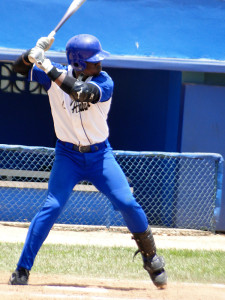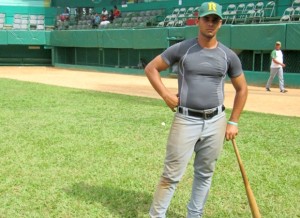SPORTS: DURING 2015 EMIGRATED FROM THE CUBAN NATIONAL LEAGUE 150 BALLPLAYERS..
In the year just ended, the migration history of Cuban baseball reached its record. 150 baseball (of various kinds, age, province, and talent level) left the country by the infinite route of roads and (legal or illegal) networks with a single goal: to get to professionalism.
This phenomenon is still developed in the middle of the restoration of diplomatic relations between Cuba and the United States. It is no secret that the embargo against Cuba has led to the emigration of baseball from the decade of the 60. However, this unprecedented record (which exceeds by 80 the number of emigrants in 2014, when about 70 players left) reaffirms the severe crisis in the national baseball.
“This is a vulnerable period in the direction primarily the exodus in the last five, six years,” said Heriberto Suarez, National Commissioner of Baseball. The progress of negotiations between MLB and Cuba are an example of mutual interest in stopping the exodus.
“It’s a goal for MLB achieve a safe and legal participation of Cubans in the MLB. We hope to negotiate cooperation and requires the US government and the Cuban government, but expect to, “he said December 15 in Havana Dan Halem, MLB executive vice president.
Days later, MLB asked the OFAC (Office of Foreign Assets Control of the United States) special permission to recruit players in Cuba. The lock prevents an agreement to generate money, baseball is still an area where OFAC has priority to allow pact.
The challenge is big and requires negotiation, but to materialize the council, 2016 could be the final year of the emigration of players. But distrust is the sign between those who go “The negotiations may last a long time, who knows how much has to wait,” he told OnCuba a young player who would not reveal his identity.
Among the 150 players who left Cuba in 2015 predominantly integrated into a promising generation of talent between 15 and 25 names. The average age of this exodus is 22.89 years. They have gone promises players 16-18 years if Adrian Morejon, Lazaro Armenteros, Miguel Vargas (son of LázaroVargas), Omar Diaz Estevez and Yusniel. Only six players beyond the age of 30 years among immigrants.
“All 30 MLB teams are interested in me. I left Cuba because I always trusted my talent and because I’m from another planet, “he told the gardener OnCuba Lázaro Armenteros.
The province lost more players in this latest wave was Havana with 31. They are followed Pinar del Rio (18), Santiago de Cuba (15), and Mayabeque Matanzas (13), Artemis (12) and Villa Clara and Las Tunas (10).
It will be difficult for all players to sign contract this list in the future. Analysts say the issue is estimated that 10 players have signed franchise only one. Other estimates put the average of 15 to one. The competition is quite strong, as the market homegrown talent competing with others of equal quality as the Dominican Republic, Venezuela and Puerto Rico.
“I’ve been here almost two years in the Dominican and in fact do not know how to live the players who do not get contracts. I have not had the opportunity to talk to someone who is in that kind of situation. To work here is very difficult. Which we manage to reach the United States will increase more opportunities to play both there and elsewhere, but here we are virtually in a hole, “he told OnCuba Lerys Aguilera, Holguin baseman.
“The dream of every Cuban baseball player is to play in the majors, and the other is that young people are not giving opportunities” says slugger leader of the last U-23 National Series, Jeans Rodriguez.
“This is for my future and my family. One is disappointed in Cuban baseball. I myself was hitting 355, a leader in homers and second in RBIs and not even let me in the Premier Reserve 12, which was the least I could do to reward me, “said Yasser Havana Julio Gonzalez, who played before going out in Pinar del I laugh.
Agencies / OnCuba / Francys Romero / Internet Photos / TheCubanHistory.com
The Cuban History, Hollywood.
Arnoldo Varona, Editor.
DEPORTES: DURANTE EL 2015 EMIGRARON DE LA LIGA NACIONAL CUBANA 150 PELOTEROS.
En el año que recién termina, la historia de la migración del béisbol cubano alcanzó su récord. 150 beisbolistas (de diversa índole, edad, provincia, nivel y talento) abandonaron el país por la infinita ruta de caminos y redes (legales o ilegales) con un único objetivo: llegar al profesionalismo.
Este fenómeno se sigue desarrollado en medio del restablecimiento de las relaciones diplomáticas entre Cuba y los Estados Unidos. No es un secreto que el embargo impuesto a Cuba ha motivado la emigración de los beisbolistas desde la década de los 60. Sin embargo, este inaudito registro (que supera en 80 el número de emigrados en 2014, cuando se fueron cerca de 70 jugadores) reafirma la severa crisis que vive el beisbol nacional.
“Esta es una etapa de vulnerabilidad en el sentido principalmente del éxodo en estos cinco, seis últimos años”, ha dicho Heriberto Suárez, Comisionado Nacional de Béisbol. El avance de las negociaciones entre la MLB y Cuba son una muestra del mutuo interés en detener el éxodo.
“Es una meta para MLB lograr una participación segura y legal de los cubanos en la MLB. Esperamos negociarlos y requiere cooperación del Gobierno de Estados Unidos y del Gobierno cubano, pero esperamos hacerlo” dijo el 15 de diciembre en La Habana Dan Halem, vicepresidente ejecutivo de MLB.
Días después, la MLB pidió a la OFAC (Oficina de Control de Activos Extranjeros de Estados Unidos) un permiso especial para contratar peloteros en Cuba. El Bloqueo impide un acuerdo que genere dinero, aún así el béisbol es un área donde la OFAC tiene prioridad para permitir un pacto.
El desafío es grande y requiere de negociaciones, pero de concretarse el concilio, el 2016 podría ser el año final de la emigración de los peloteros. Pero la desconfianza es el signo entre los que se van: “La negociaciones pueden durar mucho tiempo, quien sabe cuánto haya que esperar” le dijo a OnCuba un pelotero joven que no quiso revelar su identidad.
Entre los 150 peloteros que abandonaron Cuba en el 2015 predominan nombres integrados a una prometedora generación de talentos entre 15 y 25 años. El promedio de edad de este éxodo es de 22.89 años. Han salido peloteros promesas de 16 a 18 años como el caso de Adrian Morejón, Lazaro Armenteros, Miguel Vargas (el hijo de LázaroVargas), Omar Estevez y Yusniel Díaz. Solo seis jugadores rebasan la edad de los 30 años entre los emigrados.
“Los 30 equipos de la MLB están interesados en mí. Salí de Cuba porque confié siempre en mi talento y porque soy de otro planeta” le dijo a OnCuba el jardinero Lázaro Armenteros.
La provincia que más jugadores perdió en esta última oleada fue la Habana con 31. Luego le siguen Pinar del Río (18), Santiago de Cuba (15), Matanzas y Mayabeque (13), Artemisa (12) y Villa Clara y Las Tunas (10).
Será difícil que todos los peloteros de esta lista firmen contrato en el futuro. Según analistas del tema se estima que de cada 10 jugadores las franquicias solo firman a uno. Otras estimaciones elevan el promedio de 15 a uno. La competencia es bastante fuerte, pues con el mercado del talento cubano compiten con otros de igual calidad como el de Dominicana, Venezuela y Puerto Rico.
“Yo llevo aquí en Dominicana casi dos años y a decir verdad no sé qué hacen para vivir los peloteros que no obtienen contratos. No he tenido la oportunidad de hablar con alguno que este en ese tipo de situación. Para trabajar aquí es muy difícil. Los que logremos llegar a Estados Unidos aumentaremos mucho más las posibilidades de poder jugar tanto allí como en otro país, pero aquí estamos prácticamente en un hoyo” le dijo a OnCuba Lerys Aguilera, inicialista holguinero.
“El sueño de cada pelotero cubano es jugar en las Grandes Ligas, y lo otro es que a la juventud no le están dando oportunidades” asegura el líder jonronero de la última Serie Nacional Sub-23, Jeans Rodríguez.
“Esto es por mi futuro y el de mi familia. Uno se decepciona de la pelota cubana. Yo mismo estaba bateando 355, líder en jonrones y segundo en impulsadas y ni siquiera me dejaron en la reserva del Premier 12, que era lo mínimo que podían hacer para premiarme” aseguró el habanero Yasser Julio González, quien jugaba antes de salir en Pinar del Río.
Agencies/OnCuba/Francys Romero/Internet Photos/TheCubanHistory.com
The Cuban History, Hollywood.
Arnoldo Varona, Editor.



 SPORTS: DURING 2015 EMIGRATED from the Cuban National League 150 ballplayers. + DEPORTES: DURANTE EL 2015 Emigraron de la Liga Nacional Cubana 150 Peloteros.
SPORTS: DURING 2015 EMIGRATED from the Cuban National League 150 ballplayers. + DEPORTES: DURANTE EL 2015 Emigraron de la Liga Nacional Cubana 150 Peloteros.


